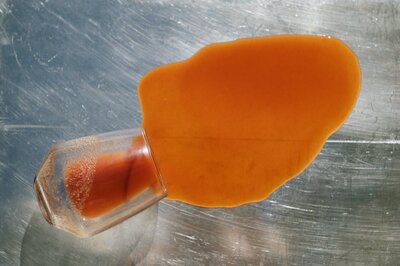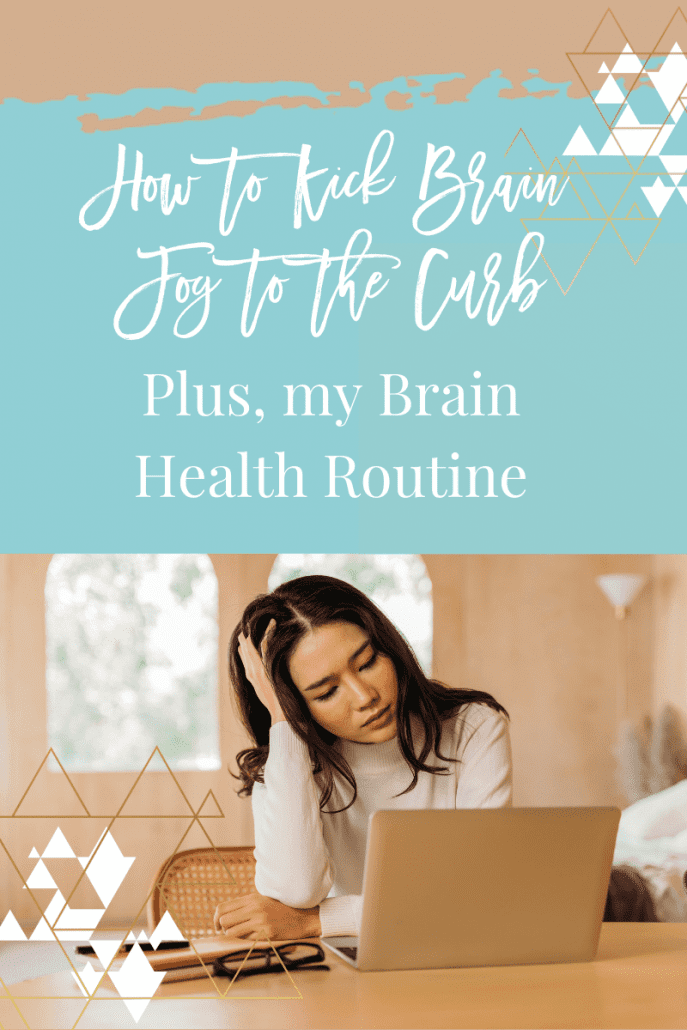

Can we talk about brain fog? I know I’m not alone on this one! I was always the one who could recognize the artist to any 80’s song in the first beat, but these days…not so much. Brain fog feels like you’ve lost your mojo! It feels like a struggle to concentrate or stay focused on tasks. It’s harder to remember things like dates and times unless you write them down. Much of this is normal after age 45, but for me, brain health is always top of mind.
Brain Fog is Pretty Common
If you’re experiencing brain fog, you’re not alone. It’s estimated that nearly 600 million people worldwide suffer from brain fog! Crazy, right? But brain fog is actually a SYMPTOM, not a diagnosis. It’s feedback from your body that your brain may need a little extra support to get back into balance. Your body is always sending you little love messages about how it’s feeling, your brain is no different.
Let’s talk about what you can do to improve your brain health and eliminate brain fog.
In this post, I’m going to cover
- What brain fog feels like
- My go-to foods for brain health, memory & focus
- My exact supplement routine for improving my own brain health
- Lifestyle factors that I implement daily to support a healthy brain
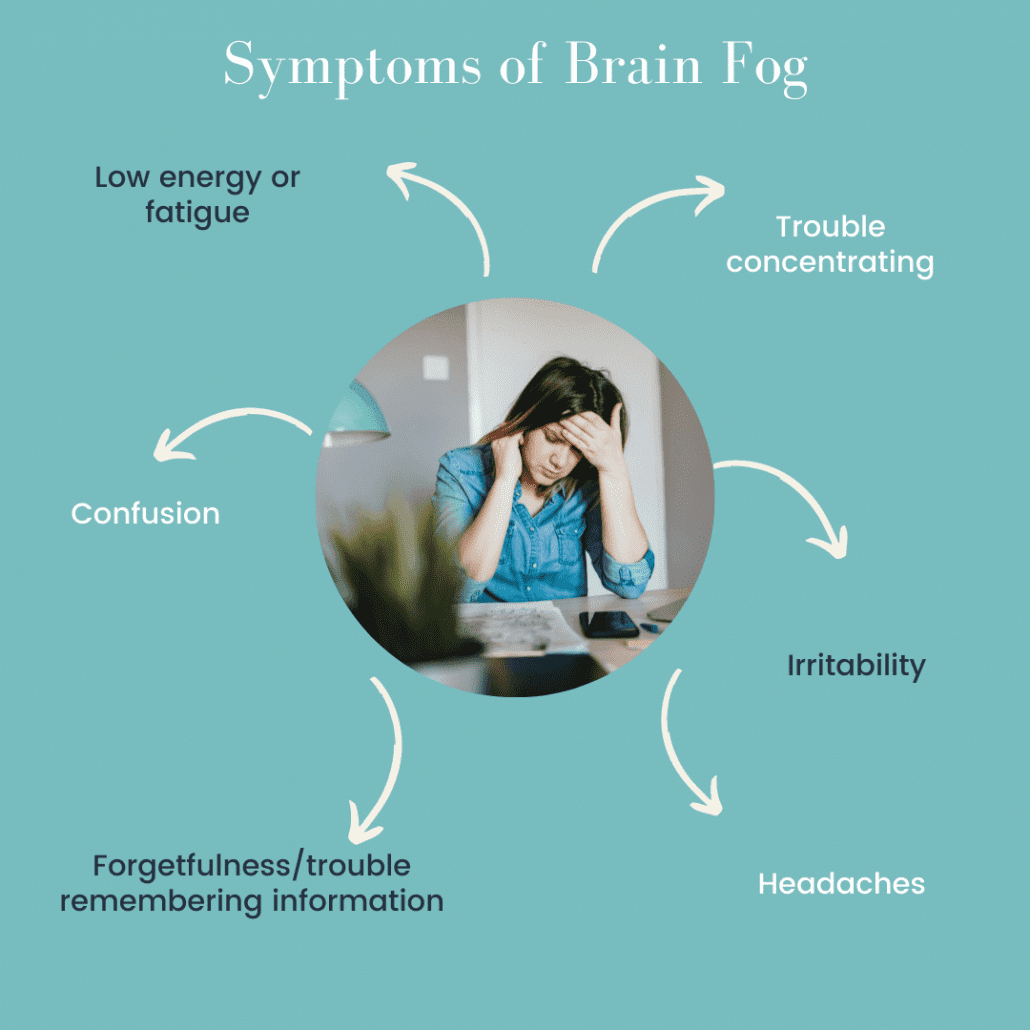

Brain Fog Symptoms
Got brain fog? It might show up like this:
- low energy or fatigue (including chronic fatigue syndrome)
- irritability
- trouble concentrating
- headaches
- forgetfulness and trouble remembering information
- low motivation, feeling hopeless or mildly depressed
- anxiety
- confusion
- trouble sleeping through the night or insomnia
- difficulty exercising
Brain fog isn’t fun and it can definitely make you think something serious is going on! The good news is there are things you can do to help. There’s actually a ton of exciting research being done in this area, but having a strong foundation is the most important. This means balancing your hormones with diet, improving gut health, moving your body every single day, getting good quality sleep, and keeping stress at bay. I call these fundamentals lifestyle medicine, and they are the first line of defense when optimizing brain health. Supplements like nootropics play a role, too — but fundamentals come first!
Causes for Brain Fog
There are several causes of brain fog. Believe it or not, one of the biggest is lack of quality sleep. Missing even just a few hours of sleep a night can impact your mental focus and bring on brain fog.
Another major cause of brain fog is stress. Stress impacts so many areas of your body! And everyday stress can cause mental fatigue.
Hormonal fluctuations are another major cause of brain fog….menopause, pregnancy, even your monthly cycle can affect how sharp you feel mentally.
What You Eat Can Help Reduce Brain Fog
Your diet can impact brain fog, too. In a good way! For starters, getting in plenty of top-shelf vegetables (think cruciferous veggies like cauliflower, broccoli, cabbage, and Brussels sprouts), leafy greens, berries, and fatty fish is a must. Also, make sure you’re not missing any important nutrients in your diet. Vitamin D, Omega 3 fats, and B vitamins are critical to brain health. A B12 deficiency can cause brain fog and so can food sensitivities. Food sensitivities to peanuts, aspartame, MSG, and dairy have been associated with brain fog. If you notice any symptoms after eating these foods, try eliminating them from your diet.
More on specific foods and nutrients below…
Foods That Support Brain Health
I always recommend a food first approach. Here’s a list of foods you should be eating regularly to keep your brain functioning at its optimal best.
Coffee:
Yup, coffee is good for the brain! It’s chock full of antioxidants and helps boost alertness, improve mood, and sharpen concentration. If you aren’t a coffee fan, there are other options below.
Turmeric:
Turmeric has so many anti-inflammatory and antioxidant benefits, and research shows it may help reduce the symptoms of depression and Alzheimers
Broccoli:
Broccoli contains so many vitamins and minerals, almost a whole days worth! Vitamin K included, which has anti-inflammatory effects on the brain
Pumpkin Seeds:
Pumpkin seeds (aka pepitas) are high in minerals like copper, iron, magnesium, and zinc, all of which help support healthy brain function
Nuts & Seeds:
Nuts and seeds contain antioxidants, omega 3 fats, and vitamin E, which are super important for cognitive function
Citrus:
Oranges, grapefruit, and other citrus fruits are high in vitamin C, which protects the brain from free radicals and helps with focus, attention, and decision speed
Eggs:
Eggs are high in B vitamins and choline. These vitamins help with regulating mood, proper brain function, and brain development (some are also rich in omega-3)
Green tea:
Green tea contains antioxidants to protect the brain, L-theanine for relaxation, and caffeine to boost alertness
Oily fish:
Salmon, mackerel, sardines, and other oily fish contain omega-3 fatty acids that are important for learning and memory. Fatty fish can slow age-related mental decline and possibly prevent depression.
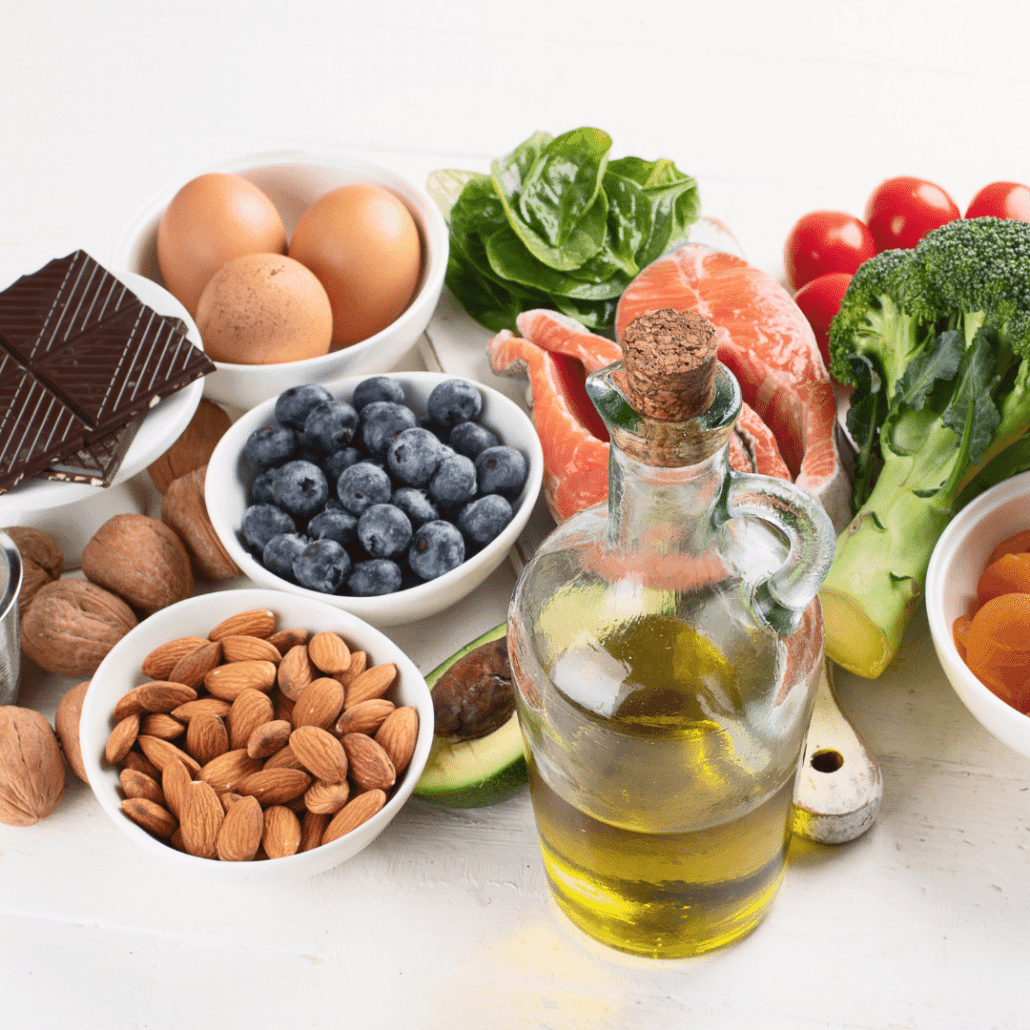

Foods That Improve Memory
- Fish oil: improves brain function in those with memory problems like Alzheimer’s disease or other cognitive impairments
- Blueberries: blueberries increase blood flow to key areas of the brain, helping with memory and concentration
- Dark chocolate: 70% cocoa (and higher) change your brain wave frequency, benefitting both memory improvement and stress reduction
- Leafy greens: dark greens (like spinach) have high levels of folate that may protect from dementia or Alzheimer’s
- Beans: legumes and beans are high in folate. Diets rich in legumes have been shown to protect memory
- Avocados: avocado is a superfood. It’s also full of monounsaturated fats that support brain health and memory
Foods That Improve Focus
- Green Tea contains caffeine and L-theanine, which improve memory and focus; it also contains catechins, which are potent neuroprotective antioxidants.
- Coffee contains caffeine and antioxidants that help improve focus on memory.
- Eggs contain choline which helps reduce inflammation and prevent cognitive decline.
- Nuts contain omega-3 fatty acids and minerals like zinc, selenium, manganese, and copper, all of which support cognitive function.
- Leafy greens (think spinach and kale) contain brain-supportive nutrients like lutein, vitamin K, nitrate, folate, alpha-tocopherol, beta-carotene, and kaempferol.
Lifestyle Medicine to Improve Brain Fog
Now let’s talk about how your lifestyle can help improve your focus. Lifestyle medicine is a medical approach that uses evidence-based behavioral interventions to prevent, treat and manage chronic disease. It’s basically how well you sleep, eat, move your body and manage stress!
Eat breakfast:
Studies have found that eating breakfast may improve short-term memory and attention, but not if it’s loaded with sugar. Your best bet for breakfast is a moderate-calorie mix of protein (hello, eggs) and healthy fats like avocado or Greek yogurt. You can also add veggies for a savory twist or a side of berries for fiber and flavor.
Get great sleep:
Sleep is our brain’s restorative time. Aim for 7-9 hours of high-quality sleep each night and you’ll likely see improvement in your memory and focus. To ensure that you get a good night’s rest, make sure to head to bed early, create a wind-down routine, make your room as dark as possible and avoid drinking caffeinated beverages after noon. There is more you can do to improve your quality of sleep. Read my tips to improve your sleep here.
Stay hydrated:
Your brain is 80% water! And it’s pretty easy to think you’re hydrated when you’re actually not. Studies show that even mild dehydration, (the loss of 1–3% of body weight) can impair brain function. So make sure you drink plenty of water throughout the day and replace the water you lose from sweating.
Exercise:
Move your body daily! Aim for 10,000-15,000 steps each day by walking outside in nature, jogging, hiking, running, swimming or biking! Exercise helps boost blood flow to the brain and has been shown to increase the size of your hippocampus, which impacts verbal memory and learning. Even a moderate amount of activity (for example getting 7,5000 steps a day, has been shown to increase brain volume and reduce brain aging.


Meditate:
Regular meditation practice has many positive effects on your health, especially brain health. Studies show that meditation can improve your focus, memory, and attention. Although all meditation types are helpful, meditation for better focus are mindfulness (where you focus on the breath and observe thoughts as they drift through your mind), concentrative (where you focus on the breath or an object), or moving meditation (yoga and tai chi).
Cold therapy:
Cold can help strengthen the blood-brain barrier and boost energy, dopamine, and serotonin. This can include cold therapy like cryotherapy, a cold tub, or even a cold shower. You can learn more about the two types of cold therapy you can do at home here.
Sunlight:
Getting sun into your eyes at dawn and dusk helps reset your circadian rhythm. Make sure to get the sun into your eyes. This will help balance morning cortisol and evening melatonin release.
Supplements to Improve Brain Fog, Memory & Focus
- Vitamin D: this fat-soluble vitamin is necessary for optimal brain health. Supplementing with vitamin D can improve memory, concentration, and mood.
- DHA: these essential fats help support brain health, memory, attention, and mood.
- Magnesium: chronic stress can lead to low magnesium levels, which can lead to brain fog and difficulty concentrating.
- Vitamin C: Vitamin C supplementation can increase memory, attention, reaction time, and focus.
- B Vitamins: vitamins B6, B9, and B12 work together to break down homocysteine, a neurotoxin that’s associated with atrophy in the brain and an increased Alzheimer’s risk.
- L-theanine: may reduce memory problems, reduce stress, improve sleep, and delayed reaction time.
- Functional mushrooms: functional mushrooms like Lion’s Mane and Cordyceps contain compounds that support focus and clarity.
- Nootropics: nootropics like Bacopa and Ginkgo Biloba help improve memory, creativity, motivation, and attention.
- Adaptogens: adaptogenic herbs like ashwagandha help balance the mind and body from daily stressors and support brain health and cognitive function.
- Curcumin: curcumin is a potent anti-inflammatory and brain-protective phytonutrient found in turmeric that is connected to improved cognitive function and mood
My Supplement Routine for Brain Health
My daily supplement routine includes brain supportive compounds in the form of nootropics, adaptogens, vitamins, and minerals. I use supplements as just that, to supplement my food intake. My routine varies based on my diet at the time, my exercise, how I’m feeling, sleeping, and other lifestyle factors. I always check in with my body before supplementing!
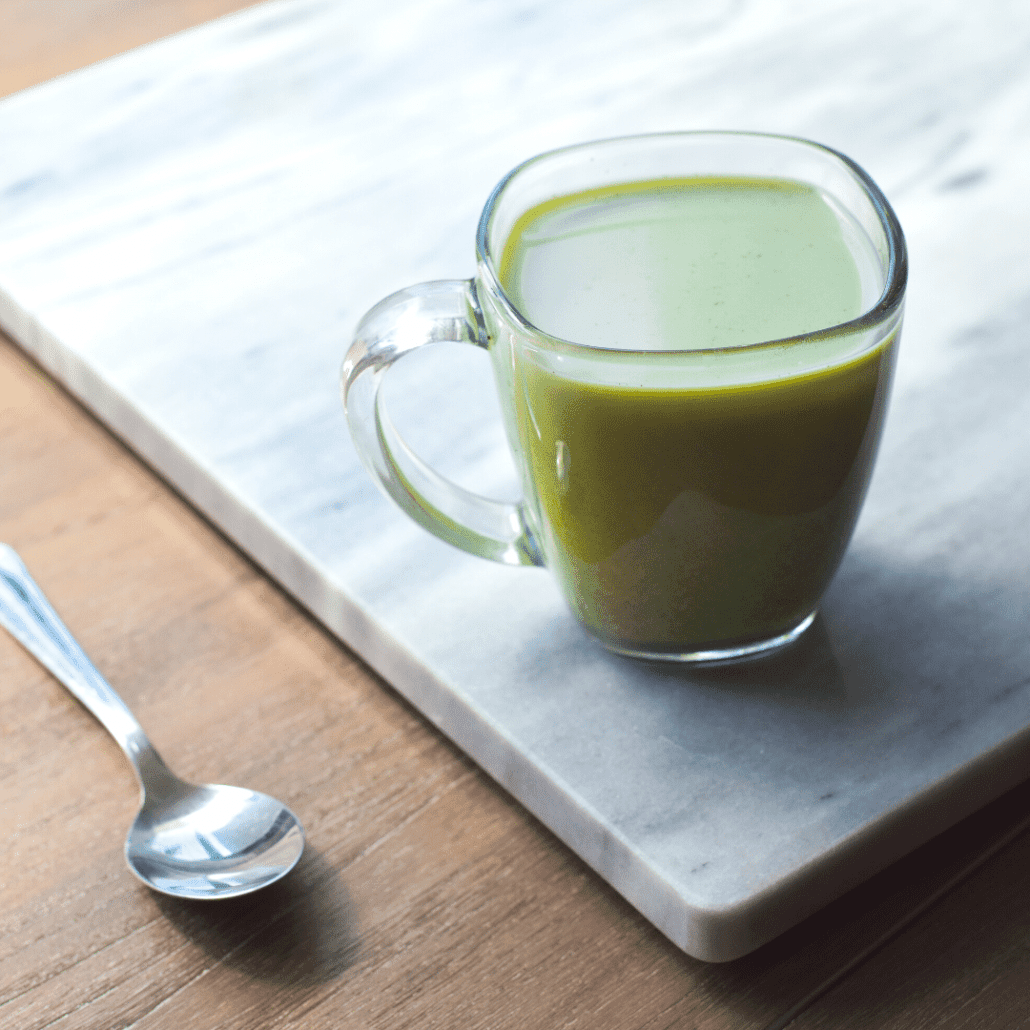
My daily regimen to beat brain fog and optimize brain health:
In the morning:
Brain Fuel Nootropic
Adaptogen mushroom blend (my favorite way to use this is in Mushroom Coffee. To make this, I mix a Master mushroom blend powder into my French press coffee)
Mid-morning:
Matcha green tea latte
Midday snack:
Four Sigmatic peanut butter protein plant-based powder with water and ice (contains 7 different functional mushrooms and adaptogens)
Evening:
Magnesium Glycinate
Vitamin D
Curcumin
Before Bed:
Nighty night tea by Traditional Medicinals
To Sum It Up
You aren’t stuck with brain fog. There’s a lot you can do to improve your brain health, eliminate brain fog, and see improvements in your focus and memory.
Incorporate more brain foods into your diet to support cognition, memory and focus. Incorporate lifestyle interventions that increase blood flow to the brain and support memory and concentration. Manage your stress level, drink more water, cut back on refined carbohydrates, and get enough high-quality sleep. These are foundational aspects for optimal brain health.
If you need personalized nutrition recommendations for improving your brain health, CONTACT ME HERE to learn more about working together.


